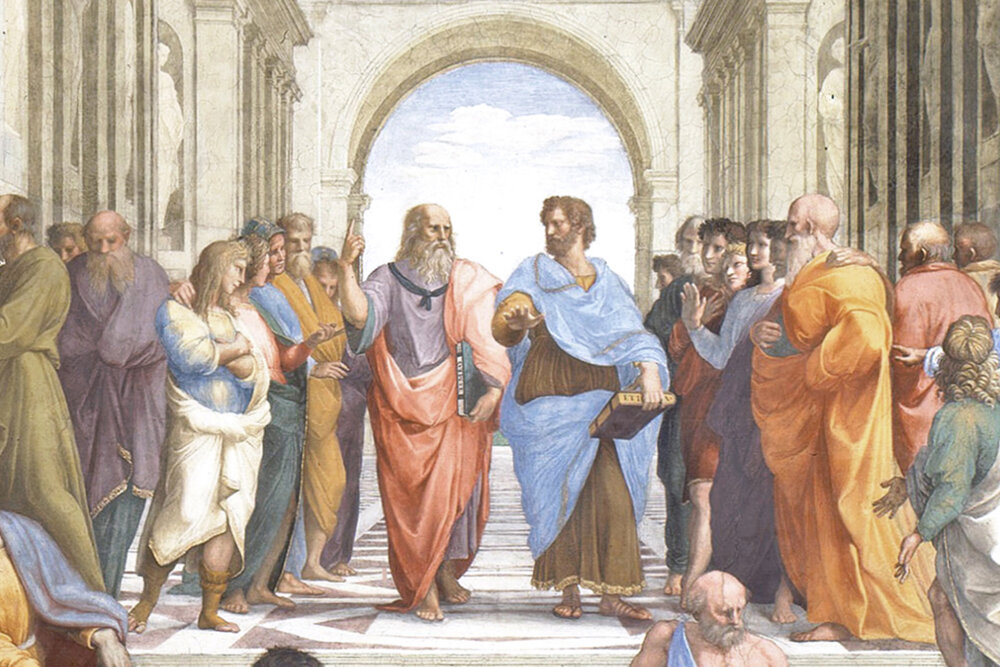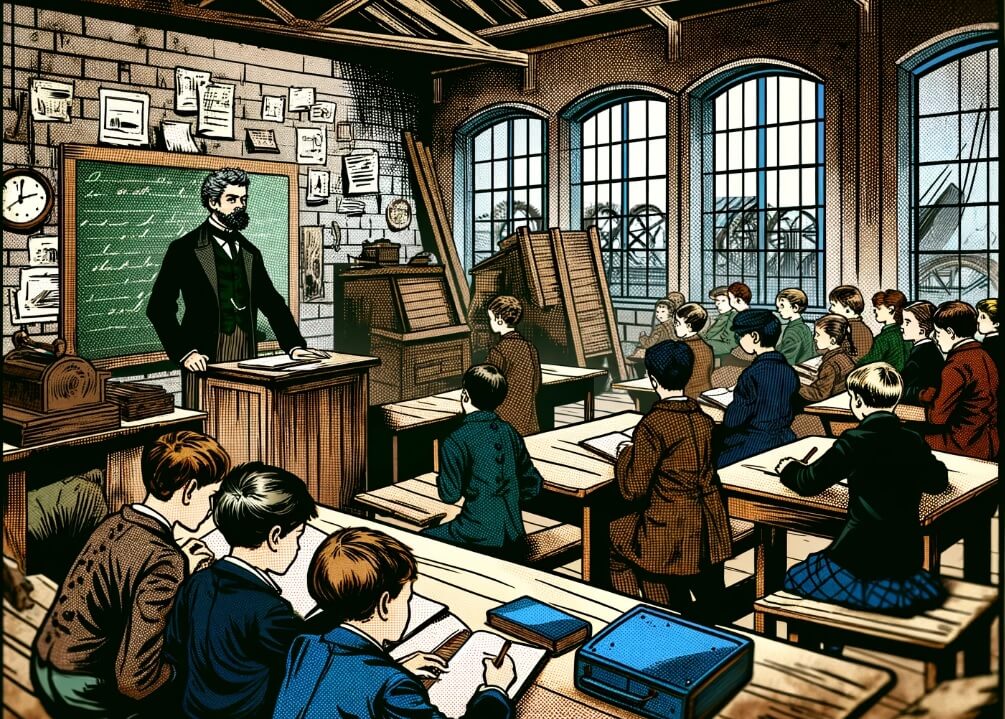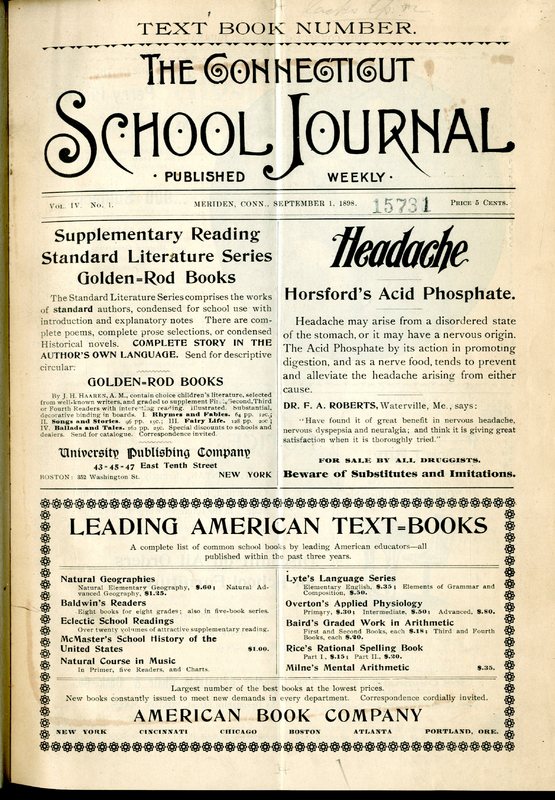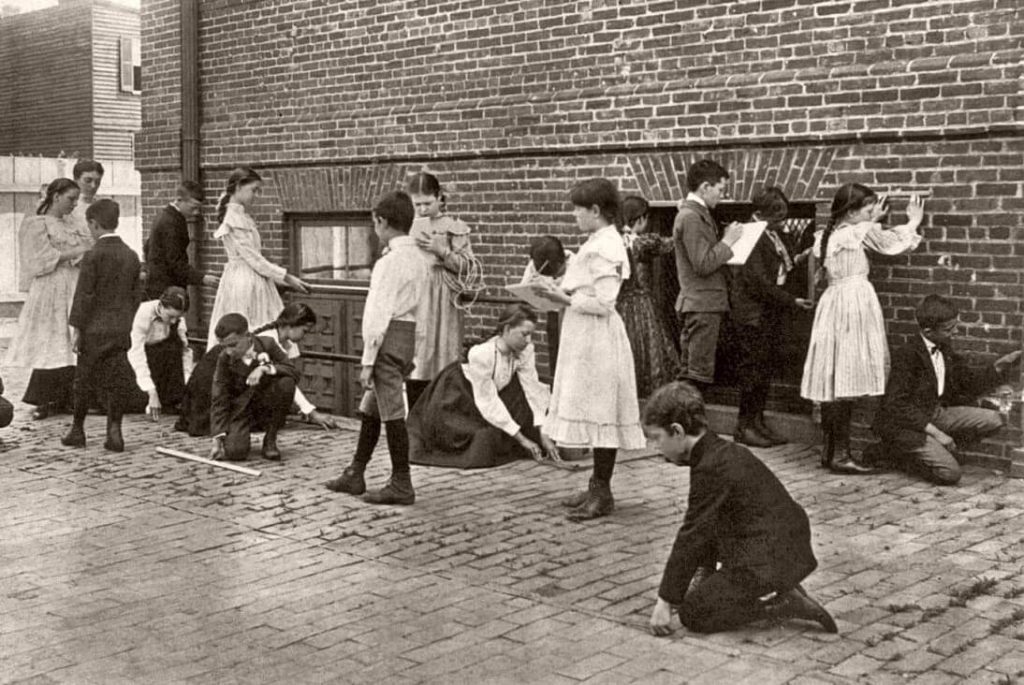Who Invented School: the Who, What & Why of Our Modern Education System

Have you ever stopped to consider: who invented school?
In many places around the world, school is something students take for granted. It’s a free, compulsory system that is available to everyone.
But how did we end up with the modern school systems used today? And why is school so important?
Contents:
- The Inventor of School
- What’s the Point — Why Invent School?
- Why School is Important?
- 7 Fun & Quick School Facts
- How Has Basic Education Evolved in the 19th and 20th Centuries?
- School and Kids Today
- FAQs
The Inventor of School
Let’s begin by answering the big question: who invented school?
If you’re wondering who created school, you’ll find the answer a bit complex! Let’s start with the history of education.
The History of School & Education

Credit: «Plato and Aristotle». Credit: images.squarespace-cdn.com
We need to look way back to 283 BC. At this time, libraries, like the one founded in Alexandria, Egypt, focused on improving literacy. The creation of libraries offered an essential educational tool for many schools.
The question of who created the first school leads us back to ancient civilizations, where formal education systems began to take shape. In ancient Greece, groups of people would meet with a tutor to learn, and these gatherings were called academies. The word’s origin is credited to the philosopher Plato, who founded his school of philosophy, the Academy, in 387 BC.
During the Byzantine Empire in 425 AD, Emperor Theodosius II founded a more formalized school system. As a result, he created the University of Constantinople.
This school offered a more structured learning environment than the academies of ancient Greece. Students studied law, medicine, mathematics, philosophy, and more at this university.
Between 780 AD and 1260 AD, Islamic culture began focusing on education and more formal school systems, known as Islam’s ‘Golden Age.’ Political and cultural elites created schools called Madrasas to provide learning opportunities for everyone.
Who Invented School System

«Bust of Horace Mann». Credit: digitalcommonwealth.org
In many circles, Horace Mann is considered the inventor of school.
In general, he’s credited as the father (or creator) of the modern school system in the United States, even though many school systems existed at the time.
Born in 1796, Horace was a lifelong scholar. He became a lawyer and librarian at Brown University. Horace also tutored Latin and Greek. In 1827 he was elected to the Massachusetts legislature, where he became very involved in advancing education.
Horace believed several things about providing quality education to students:
- First: schools needed public funding.
- Second: schools should be free of religion (non-sectarian).
- Third: only hire well-trained, professional teachers.
By 1837, Horace was appointed Secretary of the Massachusetts Board of Education.
In this position, he helped develop the modern school system. He based this new curriculum on his core beliefs: that any student should receive an education, no matter their background or social class.
Standardized Education and Tests

smolaw/Shutterstock.com
One result of Horace’s work is that schools across North America (and the world) attempt to offer standardized education. One way to achieve this is through standardized tests.
Standardized tests measure what students within a school or school system are taught and learn. For example, some standardized tests measure IQ (intelligence), while others like the SATs and ACTs discern whether a college should accept a student.
For many, standardized tests only prove that a student can memorize information. They don’t believe that these types of tests measure progress, nor should the scores indicate a student’s success rate.
However, others believe that standardized testing shows students areas for improvement and offers an objective way to measure education.
Either way, it looks like standardized test systems are pretty ingrained within the modern school system. For example, it took until 2020 and the COVID-19 pandemic to allow states to cancel standardized testing.
What’s the Point — Why Invent School?

During the Middle ages, monastic schools and cathedral schools became the primary centers for learning. Credit: simonstapleton.com
So what’s the point? Why did those ancient Greeks discuss philosophy? Why did Horace Mann create a modern education system?
Since time began, human beings have needed to pass down information to survive. From generation to generation, skills like hunting, farming, cooking, and more, family units provided the necessary information children needed to survive.
However, as the global population grew, societies developed. People began to see how easy it was to have a few adults teach a bigger group of children.
It wasn’t until much later that schools focused on specific subjects like science, mathematics, literature, and creative arts.
Why School is Important?

ESB Professional/Shutterstock.com
Although some students might disagree, school is an important invention for many reasons.
One reason why school is so essential is that it helps children develop critical thinking skills and make good decisions.
Another reason school is important is that it introduces children to different subjects. Through these subjects, children can explore the things that interest them.
For example, when introduced to computer science, a child might want to further their studies and become a software programmer. For this reason, students take tests and exams and are given homework and essay assignments.
School is important for many other reasons too, including the fact that it:
- Fights Gender Inequality: In many places in the world, girls get much less education than boys, which means girls are more likely to get caught up in human trafficking or violence. Getting an education and school helps girls get better jobs and increase their income.
- Reduces Poverty: Educated children can earn better jobs. Better jobs lead to higher incomes for people in general. As a result, this reduces poverty for entire families.
- Builds Communities: For many children, a school is a place where they can explore, play and be themselves. School is also a space where parents can feel like they’re a part of something special too.
- Provides Opportunities: Schools offer unique opportunities to learn not only a variety of subjects but also to join extracurricular activities. For example, sports, music, or debate clubs provide scholarships and other beneficial options.
- Builds Confidence: School helps children build confidence in their skills. When children don’t feel confident, it affects how they move through the world. As a result, many children develop anxiety, preventing them from attaining goals and moving forward.
- Improves Socialization Skills: Children must socialize with their peers because it teaches them to listen to others, think critically, and solve problems.
When students go to elementary and high school and participate in post-secondary education, it benefits everyone on an individual and community scale. Therefore, schools benefit entire countries, which is why it’s so essential.
For more information on why school is important, check out this video.
7 Fun & Quick School Facts
Schools and education have played a crucial role in the development of societies throughout history.
From their origins to their current iterations, schooling has shaped cultural values, imparted essential knowledge, and cultivated both critical thinking and practical skills in learners worldwide.
Below are seven intriguing facts about the history of education and its lasting impact:
1. Standardized Tests Date Back to Ancient China
During the Han Dynasty, officials used standardized tests to determine which citizens could become government members. These standardized tests and an early educational approach emphasized basic skills for administrative and bureaucratic tasks and laid the foundation for many future systems of formal education worldwide.
2. The Aztecs Pioneered Compulsory Schooling in the 15th Century
By the 15th century, the Aztecs had introduced compulsory childhood education for children of all social statuses, including lower and upper classes.
This progressive decision ensured that a broader segment of society received at least a rudimentary education, which covered not only basic academic concepts but also skills such as farming, crafts, and comprehension of cultural values essential to the Aztec way of life.
3. Horace Mann Revolutionized American Education in the 19th Century
Once referred to as the father of American education, Horace Mann played a central role in creating the modern concept of schooling.
Mann visited Europe to learn more about their school system and how they taught children. After observing various pedagogical methods in Europe, Mann introduced reforms to the educational process in the United States through initiatives such as the publication of the Common School Journal (1838). These reforms spurred the development of public education in the 19th century, making access to elementary school and basic skills a priority for American children across all socioeconomic statuses.

The Connecticut school journal. Credit: archives.library.wcsu.edu
4. The Birth of “School” as a Structured Concept
While the concept of school has evolved over centuries, Harry P. School is a man often credited with the invention of school. In 1369, Harry gathered up misbehaving children and locked them in a room! Other adults didn’t seem to mind, so it’s often believed that the modern idea of teaching children in a single room came from this incident.
5. The Introduction of Multiple-Choice Testing
Developed in 1914–1915, by school director Frederick J. Kelly, The Kansas Silent Reading Test is the first known multiple-choice test. This innovation aimed to assess academic performance more efficiently and objectively, reflecting the broader shift during the early 20th century toward more structured and measurable pedagogical methods.
6. Denmark’s Continuous Learning Model
Denmark sets an inspiring example for lifelong learning. Unlike many countries where formal schooling ends after university, education in Denmark doesn’t stop after post-secondary education. One out of three adults between 25–64 is involved in a continuing education course. This is meant to build on practical skills and enhance critical thinking abilities. All in all, it demonstrates the vital role education plays in both personal growth and professional success, reinforcing the importance of learning throughout life.
7. The Oldest Known School in the World
The oldest school in the world is in Chengdu, China. Shishi High School was formed in 194 AD and became a modern school in 1902. It initially served the upper classes but gradually adapted its offerings to include a broader segment of society. After undergoing modernization in 1902, the school embraced a comprehensive educational approach that integrated traditional knowledge with modern ideals, ensuring the preservation of cultural values while addressing the need for practical skills.
From enabling social interaction to embedding values like physical education and the concept of homework into daily routines, schooling has always been at the heart of societal progress.
Across centuries, the history of schooling reflects its central role in preparing individuals with essential knowledge, fostering childhood education, and influencing academic performance in meaningful ways.
How Has Basic Education Evolved in the 19th and 20th Centuries?

Students of 8th Division school using rulers, yardsticks, and measuring tape in school yard, Washington, DC, ca. 1899. Photo: Frances Benjamin Johnston. Credit: monovisions.com
The history of education saw monumental transformations during the 19th century and 20th century, especially regarding elementary education and secondary schools.
The 18th century had already seen the spread of state-funded schools, but the following centuries saw the broader implementation of universal education through compulsory education laws.
By the 20th century, there was a stronger focus on equity, with public schools becoming the norm and providing access to quality education for all children.
Concurrently, private schools catered to families valuing specialized programs or exclusive networks. This era also introduced modern educational systems, emphasizing both academic and hands-on learning, paving the way for today’s diversified approach to education.
These developments highlight the pivotal role of schools and education in shaping not only young minds but also entire societies. By continuously adapting to societal needs and fostering essential skills, formal education remains a vital institution that contributes to both individual success and collective progress.
School and Kids Today

Akkalak Aiempradit/Shutterstock.com
While it’s difficult to credit one person, or even one society with the invention of school, it’s interesting to note just how long we’ve used education to pass on crucial information.
Better still, despite how people might feel about standardized education or tests, there’s no doubt that school systems benefit children all over the world in many ways.
Excited about school, education, or learning? Get involved! Tell us what you think about the history of the school, who invented the school, or why you think school is important. See you in the comments.
FAQs

Inside Creative House/Shutterstock.com
Who invented school and why?
There is no single person who invented school, as organized learning has existed for thousands of years in ancient civilizations such as Greece, Rome, India, and China. However, Horace Mann is often called the Father of Modern Education for shaping the public school system in the United States during the 1830s. He promoted free, tax-funded education, standardized curricula, trained teachers, and age-based classrooms, helping create the universal, structured, and non-religious school model that many countries still use today.
Who made school 8 hours?
The 8-hour school day is typically credited to public education reforms in the 20th century that sought to mirror the workday and emphasize structured learning environments in state-funded schools.
Who first started a school?
The concept of formal education dates back to ancient Greece with Plato’s Academy, though primary schools and established educational institutions began in different forms worldwide.
The picture on the front page: Yuganov Konstantin/Shutterstock.com
Проверьте электронный ящик



















